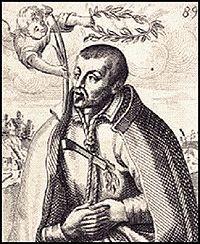Planning worship?
Check out our sister site, ZeteoSearch.org,
for 20+ additional resources related to your search.
- |
User Links
Search Results
A Child My Choice
Author: Rev. Robert Southwell, S.J., 1561-1594 Appears in 7 hymnals First Line: Let folly praise what fancy loves Topics: Christmas Used With Tune: [Let folly praise what fancy loves]
A Child My Choice
Tye (Acts)
Meter: 8.6.8.6 D Appears in 1 hymnal Composer and/or Arranger: Christopher Tye Tune Key: G Major Incipit: 47123 43232 1776 Used With Text: Let folly praise what fancy loves
Tye (Acts)
[Let folly praise what fancy loves]
Appears in 598 hymnals Tune Sources: Würtenburg Gesangbuch, 1784; Mainz Gesangbuch, 1853 Tune Key: A Major Incipit: 51765 13455 67122 Used With Text: A Child My Choice
[Let folly praise what fancy loves]
Let Folly Praise That Fancy Loves
Author: Robert Southwell, 1561-1595 Hymnal: Common Praise (1998) #152 (1998) Meter: 8.6.8.6 D Lyrics: 1 Let folly praise that fancy loves;
I praise and love that child
whose heart no thought, whose tongue no word,
whose hand no deed defiled.
I praise him most, I love him best;
all praise and love are his.
While him I love, in him I live,
and cannot live amiss.
2 Love's sweetest mark, laud's highest theme,
our most desired light.
To love him life, to leave him death,
to live in him delight.
He mine by gift, I his by debt,
thus each to other due:
first friend he was, best friend he is;
all times will find him true.
3 Though young, yet wise, though small, yet strong,
though man, yet God he is;
as wise he knows, as strong he can,
as God he loves to bless.
His knowledge rules, his strength defends,
his love doth cherish all;
his birth our joy, his life our light,
his death our end of thrall. Topics: Christmas; Epiphany Scripture: Isaiah 49:1-7 Languages: English Tune Title: A PURPLE ROBE
Let Folly Praise That Fancy Loves
Let folly praise that fancy loves
Author: Robert Southwell, 1560-1595 Hymnal: Hymns of the Kingdom of God #43 (1910) Languages: English Tune Title: MATERNA
Let folly praise that fancy loves
Let folly praise that [what] fancy loves
Author: Robert Southwell Hymnal: The Church Hymnary #203 (1893)
Let folly praise that [what] fancy loves
Arthur Sullivan

1842 - 1900 Composer of "NOEL" in Hymns of the Kingdom of God Arthur Seymour Sullivan (b Lambeth, London. England. 1842; d. Westminster, London, 1900) was born of an Italian mother and an Irish father who was an army bandmaster and a professor of music. Sullivan entered the Chapel Royal as a chorister in 1854. He was elected as the first Mendelssohn scholar in 1856, when he began his studies at the Royal Academy of Music in London. He also studied at the Leipzig Conservatory (1858-1861) and in 1866 was appointed professor of composition at the Royal Academy of Music. Early in his career Sullivan composed oratorios and music for some Shakespeare plays. However, he is best known for writing the music for lyrics by William S. Gilbert, which produced popular operettas such as H.M.S. Pinafore (1878), The Pirates of Penzance (1879), The Mikado (1884), and Yeomen of the Guard (1888). These operettas satirized the court and everyday life in Victorian times. Although he composed some anthems, in the area of church music Sullivan is best remembered for his hymn tunes, written between 1867 and 1874 and published in The Hymnary (1872) and Church Hymns (1874), both of which he edited. He contributed hymns to A Hymnal Chiefly from The Book of Praise (1867) and to the Presbyterian collection Psalms and Hymns for Divine Worship (1867). A complete collection of his hymns and arrangements was published posthumously as Hymn Tunes by Arthur Sullivan (1902). Sullivan steadfastly refused to grant permission to those who wished to make hymn tunes from the popular melodies in his operettas.
Bert Polman
Arthur Sullivan
Robert Southwell

1561 - 1595 Person Name: Rev. Robert Southwell, S.J., 1561-1594 Author of "A Child My Choice" in Hymnal of Christian Unity Southwell, Robert, was b. at Horsham St. Faith, Norfolk, about 1561, educated at Paris and at Rome, and entered the Society of Jesus at Rome, Oct. 17, 1578. He spent part of his noviciate at Tournai in Belgium, but returned to Rome and completed his studies there. After being ordained priest in 1584, he returned to England in 1586. He was arrested in 1592 on the charge of high treason, committed to the Tower of London, formally tried at Westminster, Feb. 21, 1594-5, and executed the next day at Tyburn.
His Poetical Works were collected in 1856 by W. B. Turnbull, and re-edited in 1872 more completely and more carefully by Dr. A. B. Grosart, from the Add. manuscript 10422 in the British Museum, from a manuscript, perhaps autograph, at Stonyhurst College, Lanes., and from the printed editions of the individual works. One of his carols is noted at p. 210, ii., one of his translations at p. 663, ii., three additional are in the Arundel Hymns, 1902. They are all in Grosart's edition and are here cited as they are found in the Add. 10422, the spelling being preserved:—
1. As I in hoarie winters nyght. [Christmas]. At f. 10 b. This is the admirable poem entitled "The Burning Babe."
2. Behoulde a seelie tender Babe. [Christmas.] At f. 11. See p. 210, ii.
3. In Paschall fest, ye ende of auntient rite. [Holy Communion.] At f. 17 b.
4. Let folly prayse that phaney loues. [Christmas.] At f. 9. The Arundel reads "what fancy loves."
5. Prayse, 0 Syon, prayse, prayse thy Saviour. At f. 16. From the "Lauda Sion," p. 663, ii.
See also notices in the Month for Oct. 1894, and Feb. and March 1895, and in the Dublin Review, Oct. 1903. [Rev. James Mearns, M.A.]
--John Julian, Dictionary of Hymnology, New Supplement (1907)
Robert Southwell


 My Starred Hymns
My Starred Hymns



